DISSEMINATION

DISSEMINATION ACTIVITIES
- On 30 January 2023 took place a new Infoday for fostering the Action in Inclusiveness Target Countries (ITC) in Podgorica, Montenegro. *link to the news on University page: https://www.ucg.ac.me/objava/blog/1267/objava/158028-info-dan-o-digitalnoj-forenzici-na-elektrotehnickom-fakultetu-ljudi-su-ti-koji-cine-greske (https://urldefense.com/v3/__https://www.ucg.ac.me/objava/blog/1267/objava/158028-info-dan-o-digitalnoj-forenzici-na-elektrotehnickom-fakultetu-ljudi-su-ti-koji-cine-greske__;!!D9dNQwwGXtA!XBm_5pa9uvn5fOFsVirJ3cSCaIIHSpgoLt25CzozRbpISJWWO1TLT4ehT7tisF0lbymfxLkfD7f3YudojclI4Vpuckfb$)
- On October 3, 2020, viviana Mascardi will participate in the panel “Come, dove, quando: l’algoritmo della professione che verrà” (How, where, when: the algorithm of the forthcoming profession) in Verona.* link to the scientific programme: programma scientifico
<https://www.convegnoagi2019.it/convegno-AGI-2019-programma-scientifico.pdf?v=7>
* link to the brochure del Convegno AGI
<https://www.convegnoagi2019.it/AGI2019_Brochure-web.pdf>
- On October 29, 2020, will be held the OPEN DAY INTELLIGENZA ARTIFICIALE E PROCESSO, in the Salone Valente Palazzina Anmig, Via San Barnaba 29 – Milano, with the participation of Viviana Mascardi, in which the Introduction to Artificial Intelligence and study of the ethical problem within th scientific community and the DigForASP Cost Action on digital forensics will be presented.
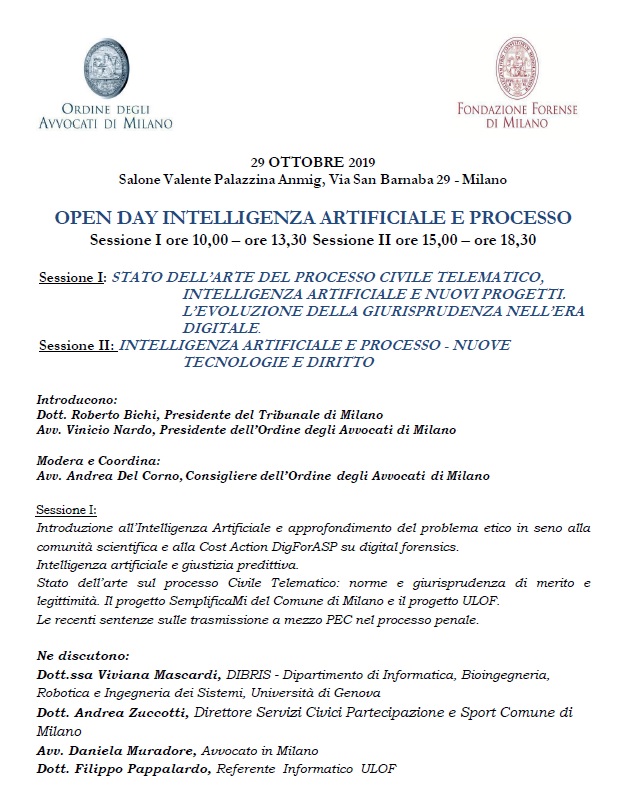
- Ken Satoh, Stefania Constantini and Raffaele Olivieri (members of the Action) organized an international workshop on AI application to forensics (AI2Forensics) associated with KR 2020 (virtual workshop) on 14 September:
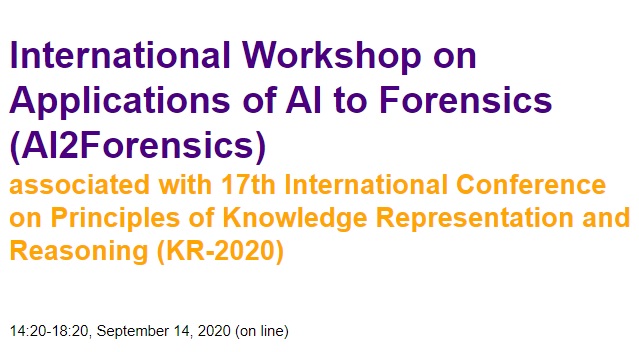
- On July 9, 2020, Jesús Medina (Action Chair) will attend a conference entitled Modelling Vagueness and Uncertainty in DH with a talk entitled DIGital FORensics: evidence Analysis via intelligent Systems and Practices (DigForASP). COST Action 17124. Goals and intermediate achievements. Francesca A. Lisi (Science Communication Manager) will also attend the conference with a presentation entitled Representing Fuzzy Quantified Sentences in OWL 2.

- On May 22, 2020, Raffaele Olivieri (WG1 Leader) will attend a seminar entitled I percorsi dell’intelligenza artificiale nel diritto with a talk entitled Intelligenza Artificiale applicata alle Investigazioni di Polizia e di Digital Forensics, to be held through the Zoom streaming platform (h.17.00 – h.19.00 in Italy) and which is part of an interdisciplinary path dedicated to AI. The event has been organized by Emanuela Cerasella, a new member of the Action and a lawyer in criminal filed at the Court of Rome. She is also the coordinator of the study and research of the sub-group of “Neurodiritto of the Neurobioethics” at Regina Apostolorum Pontifical University and the European University of Rome, directed by Prof. Father Alberto Carrara LC.
-Meeting ID: 971 543 8095
-Link: https://us02web.zoom.us/j/9715438095
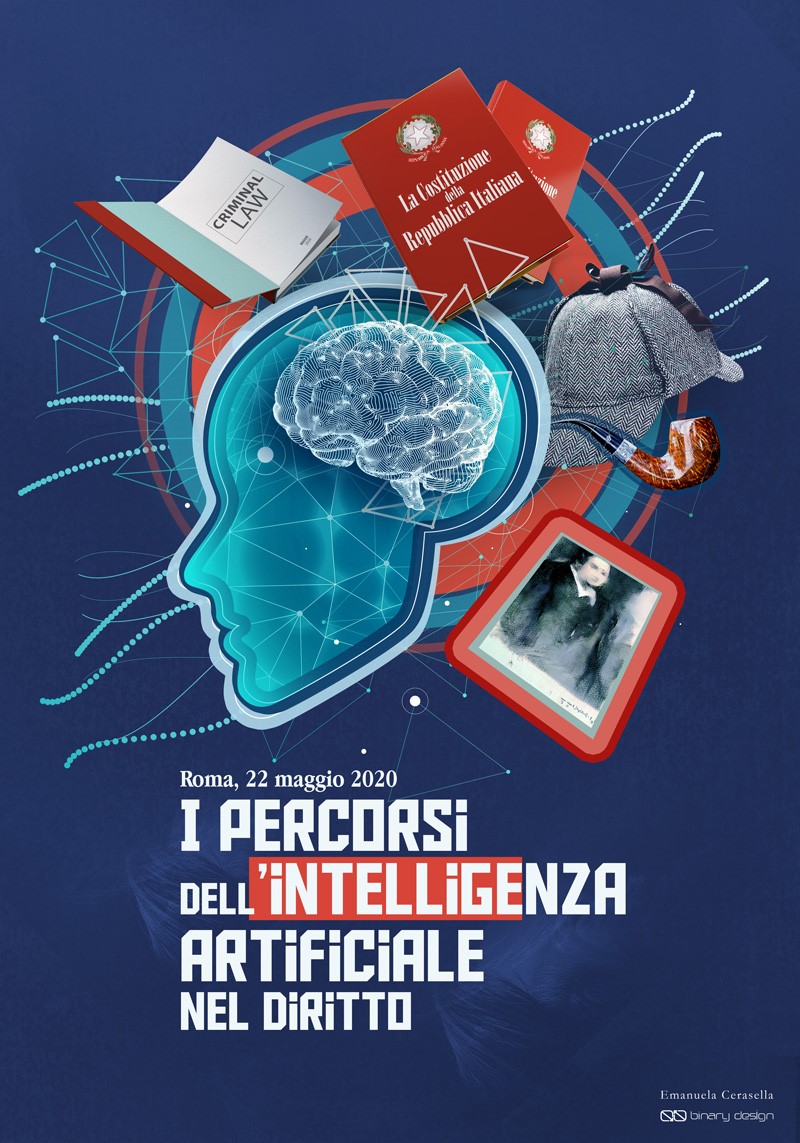
- On the 12th and 13th of May 2020 the Italian School of Magistracy (Scuola Superiore della Magistratura, SSM) offered a course entitled Artificial Intelligence and Jurisdiction Practice, (“L’intelligenza artificiale e la pratica della giurisdizione: organizzazione degli uffici e funzione decisoria”, https://www.scuolamagistratura.it/documents/20126/0/ANNO+2020_ELENCO+CORSI+SVOLTI+ON+LINE.pdf/f081dd31-0eef-d5b1-5b1e-1699cc163af2?t=1595498998258)
Within that course, Viviana Mascardi and a Magistrate of the Tribunal of Genova, Domenico Pellegrini, were in charge for the working group on Criminal Law carried out during the afternoon of May 12th. Once they aligned their shared terminology, the set up of the activities and the preparation of the teaching material run smoothly and many connections between the Italian law and computational logics were discovered, from the adoption of modus ponens as a well known oratory technique to closed world assumption.
To show to the attendees the potential of computational logic, Mascardi and Pellegrini implemented a “logical judge” inspired by a real case of robbery. Although the judge is no more than a simple exercise of knowledge representation in Prolog, showing what automated reasoning in the legal domain could achieve via a practical demonstration to more than 70 magistrates represents a first and unique attempt in Italy and in the international panorama.
- On February 26-27, 2020, Raffaele Olivieri and Francesca A. Lisi attended the congress “Il “Buon” Algoritmo? Intelligenza Artificiale: Etica, Diritto, Salute“, held in the Vatican City, with a talk entitled “Cost Action CA-17124 DigForASP: A European cooperative Action for AI applications in Police and Digital Investigations An Exploration of Investigation Complexity”.
Authors:
Jesùs Medina – Chair DigForASP – University of Cadiz – jesus.medina@uca.es (Spain)
Stefania Costantini – vice-Chair – University of L’Aquila – stefania.costantini@univaq.it (Italy)
Francesca Alessandra Lisi – Science Communication Manager – University of Bari – francesca.lisi@uniba.it (Italy)
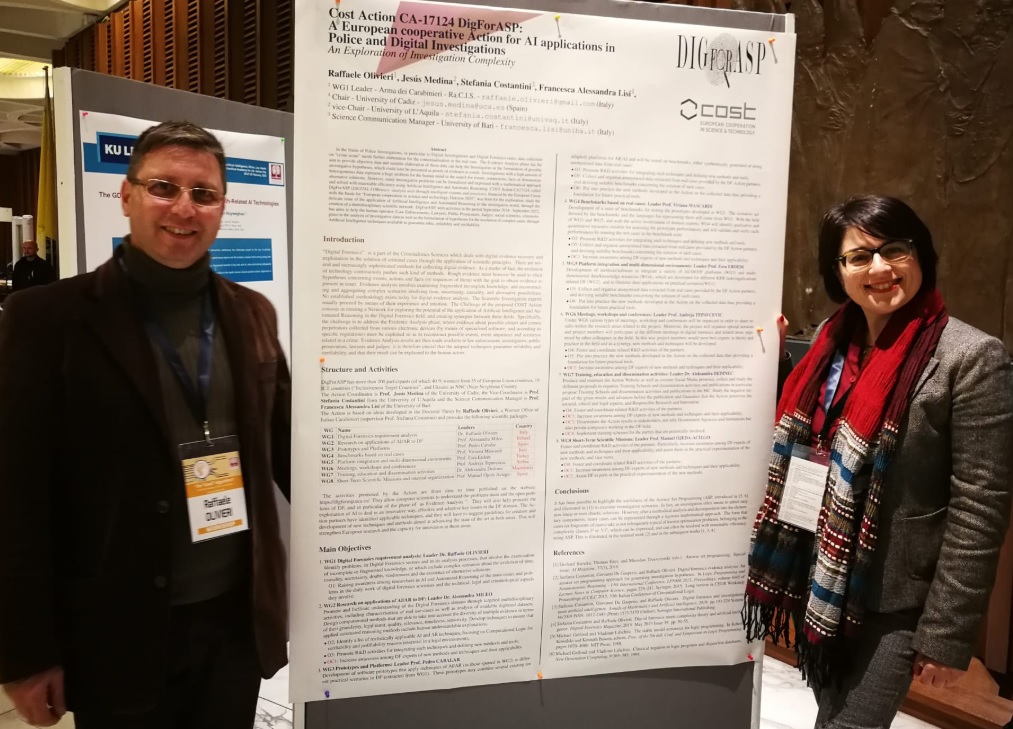
- On February 17-22, 2020, Zeno Jean Geradts (MC member of the Action) attended the “72nd Annual Scientific Meeting” of the American Academy of Forensic Sciences in Anaheim (United States), with a talk entitled “The Application of Artificial Intelligence (AI) in Digital Forensic Science” (page 463) and organized a workshop with a presentation on deep fakes entitled “Forensic Multimedia Authentication: Real-Life Challenges” (page 30).
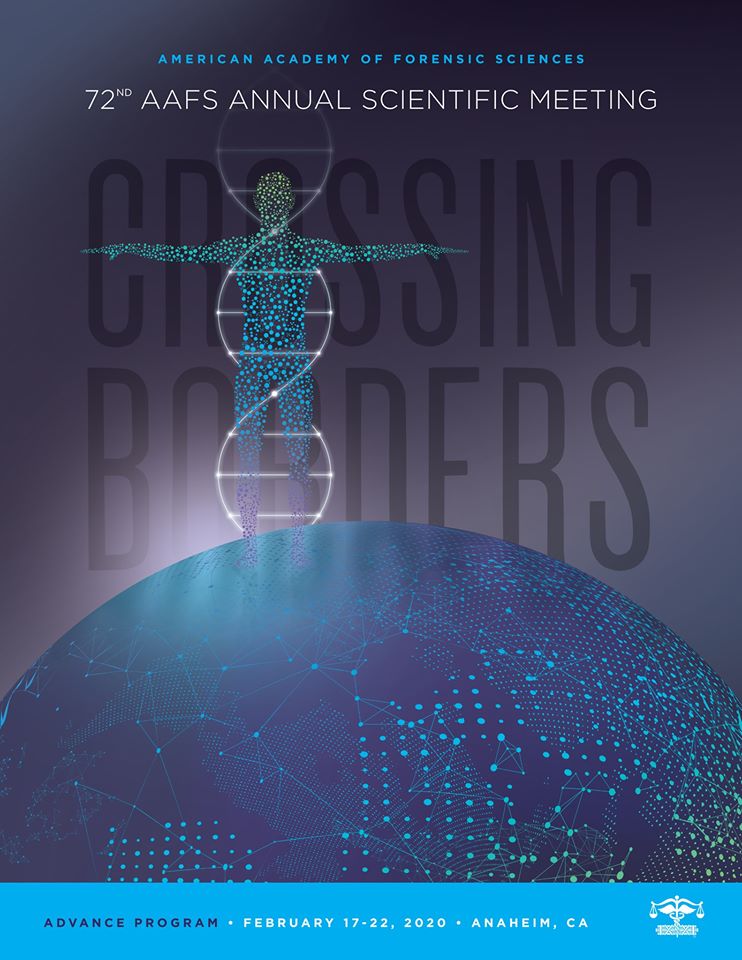
- On January 4-6, 2020, David Billard (MC Member) attended the 6th International Conference on Computing and Data Engineering (ICCDE2020) held in Sanya, with a talk entitled “Digital and Cyber Forensics in the Artificial Intelligence Era”.
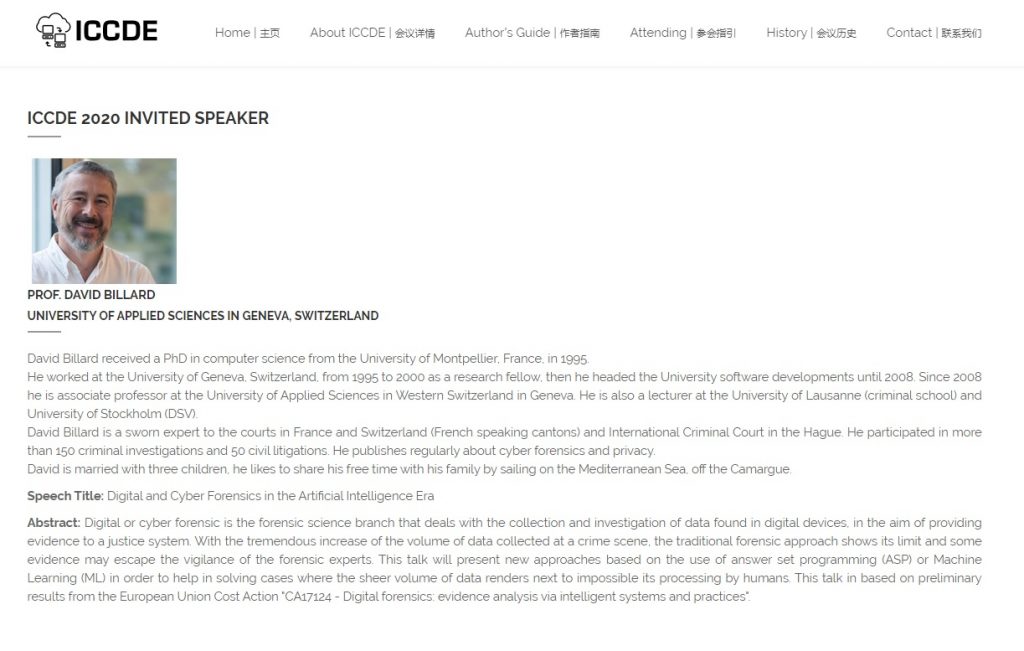
- On December 20, 2019, Raffaele Olivieri (Leader of WG1: Digital Forensics requirement analysis) attended the IISFA CHRISTMAS Seminario: Captatori informatici e nuove tecniche di intercettazione attiva: lo stato dell’arte della normativa held in Rome,organised by the International Information System Forensics Association, with a talk entitled ” Digital forensics ed intelligenza artificiale: lo stato dell’arte” (Digital Forensics amd Artificial Intelligence – state of art).
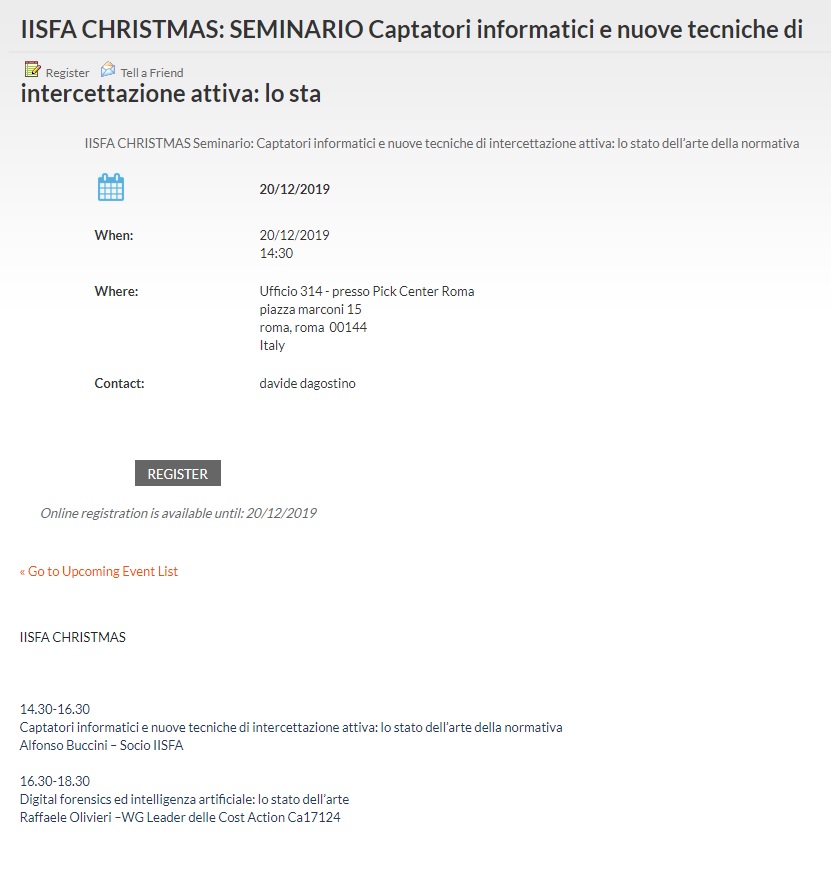
- On November 22, 2019, at Bologna University (Italy), Raffaele Olivieri (Leader of WG1: Digital Forensics requirement analysis) participated in the Seminar “Analisi forense di dati digitali: linee guida e nuove prospettive” with a conference entitled “Analisi forensi attraverso sistemi intelligenti: stato dell’arte”.
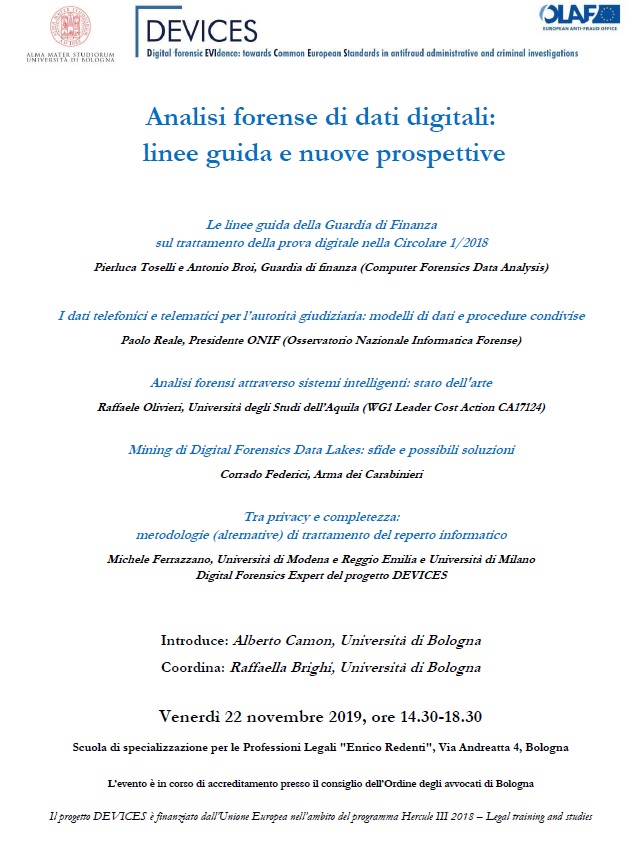
- On November 15, 2019, at the Institute for Biostatistics and Medical Informatics, Faculty of Medicine of the University of Ljubljana (Slovenia), Andreja Tepavcevic, Ivana Stajner Papuga gave a presentation entitled “Artificial intelligence methods in digital forensics”.
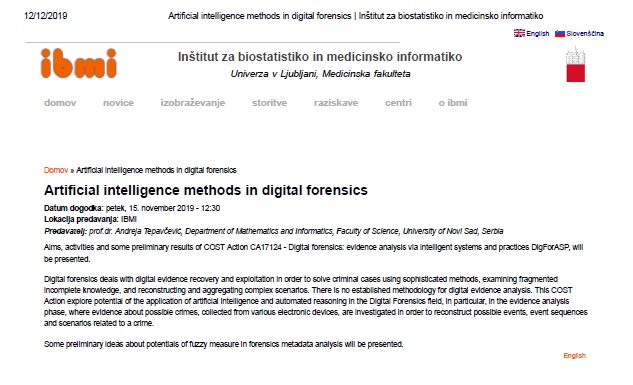
- Address Space Layout Randomization Comparative Analysis on Windows 10 and Ubuntu 18.04 LTS. Raquel Vázquez Díaz, Martiño Rivera-Dourado, Rubén Pérez-Jove, Pilar Vila Avendaño, José M. Vázquez-Naya. Eng. Proc. 2021, 7(1), 26; https://doi.org/10.3390/engproc2021007026
- Applying Artificial Intelligence for Operating System Fingerprinting. Rubén Pérez-Jove, Cristian R. Munteanu, Alejandro Pazos Sierra, José M. Vázquez-Naya. Eng. Proc. 2021, 7(1), 51; https://doi.org/10.3390/engproc2021007051
- DEL-REAL, Cristina. “Panorama institucional de la gobernanza de la seguridad en España”, Revista de Estudios Jurídicos y Criminológicos, n.º 6, Universidad de Cádiz, 2022, pp. 15- 51, DOI: https://doi.org/10.25267/REJUCRIM.2022.i6.03
- Del-Real, C., Díaz-Fernández, A.M. Understanding the plural landscape of cybersecurity governance in Spain: a matter of capital exchange. Int. Cybersecur. Law Rev. 3, 313–343 (2022). https://doi.org/10.1365/s43439-022-00069-4
- Cristina Del-Real & María José Rodriguez Mesa (2022) From black to white: the regulation of ethical hacking in Spain, Information & Communications Technology Law, DOI: 10.1080/13600834.2022.2132595
- Jevremovic, A., Kostic, Z. & Perakovic, D. Energy-Efficient Edge Intelligence: A Comparative Analysis of AIoT Technologies. Mobile Netw Appl (2023). https://doi.org/10.1007/s11036-023-02122-w
- del Real Castrillo, Cristina. La gobernanza de la ciberseguridad en España: un estudio empírico de los actores, redes de colaboración y prospectiva desde las teorías de la seguridad plural. Diss. Universidad de Cádiz, 2021.
- Joseph Boudou, Martín Diéguez, and David Fernández-Duque. Complete intuitionistic Temporal Logics for Topological dynamics. Journal of Symbolic Logic, 87, pp. 995–1022, 2022.
- Juan P. Aguilera, Martín Diéguez, David Fernández-Duque, and Brett McLean. A Gödel Calculus for Linear Temporal Logic. 19th International Conference on Principles of Knowledge Representation and Reasoning (KR), Ed.: Gabriele KernIsberner and Gerhard Lakemeyer and Thomas Meyer, 2022.
- Pedro Cabalar, Martín Diéguez, Torsten Schaub, and Anna Schuhmann. Metric Temporal Answer Set Programming over Timed Traces. 16th International Conference on Logic Programming and Nonmonotonic Reasoning (LPNMR), Ed.: Georg Gottlob and Daniela Inclezan and Marco Maratea, Springer, pp. 117–130, 2022.
- Juan P. Aguilera, Martín Diéguez, David Fernández-Duque, and Brett McLean. Time and Gödel: Fuzzy Temporal Reasoning in PSPACE. 28th International Workshop on Logic, Language, Information, and Computation (WoLLIC), Ed.: Agata Ciabattoni and Elaine Pimentel and Ruy J. G. B. de Queiroz, Springer, pp. 18–35, 2022.
- Philippe Balbiani, Joseph Boudou, Martín Diéguez, and David Fernández-Duque. Bisimulations for Intuitionistic Temporal Logics. IfCoLog Journal of Logics and their Applications, 8, pp. 2265–2286, 2021.
- Joseph Boudou, Martín Diéguez, David Fernández-Duque, and Philip Kremer. Exploring the Jungle of Intuitionistic Temporal Logics. Theory Practice on Logic Programming, 21, pp. 459–492, 2021.
- Pedro Cabalar, Martín Diéguez, Susana Hahn, and Torsten Schaub. Automata for Dynamic Answer Set Solving: Preliminary Report. International Conference on Logic Programming 2021 Workshops co-located with the 37th International Conference on Logic Programming (ICLP 2021), Ed.: Joaquín Arias and Fabio Aurelio D’Asaro and Abeer Dyoub and Gopal Gupta and Markus Hecher and Emily LeBlanc and Rafael Peñaloza and Elmer Salazar and Ari Saptawijaya and Felix Weitkämper and Jessica Zangari, CEUR-WS.org, 2021.
- Philippe Balbiani, Martín Diéguez, and David Fernández-Duque. Some constructive variants of S4 with the finite model property. 36th Annual ACM/IEEE Symposium on Logic in Computer Science, LICS, IEEE, pp. 1–13, 2021.
- Philippe Balbiani, Joseph Boudou, Martín Diéguez, and David Fernández-Duque. Intuitionistic Linear Temporal Logics. ACM Transactions on Compututational Logic, 21, pp. 14:1–14:32, 2020.
- Pedro Cabalar, Martín Diéguez, Torsten Schaub, and Anna Schuhmann. Towards Metric Temporal Answer Set Programming. Theory Practice on Logic Programming, 20, pp. 783–798, 2020.
- Pedro Cabalar, Martín Diéguez, Torsten Schaub, and François Laferrière. Implementing Dynamic Answer Set Programming over Finite Traces. 24th European Conference on Artificial Intelligence (ECAI), Ed.: Giuseppe De Giacomo and Alejandro Catalá and Bistra Dilkina and Michela Milano and Senén Barro and Alberto Bugarín and Jérôme Lang, IOS Press, pp. 656–663, 2020.
- Francesca A. Lisi: Combining Knowledge Representation and Machine Learning in Forensics. Proceedings of the International Workshop on Applications of AI to Forensics 2020 (AI2Forensics 2020), Sept. 14, 2020. https://research.nii.ac.jp/~ksatoh/AI2Forensics/AI2Forensics_proceedings.pdf
- Raffaele Olivieri, Jesùs Medina, Stefania Costantini, Francesca Alessandra Lisi : “Cost Action CA-17124 DigForASP: A European cooperative Action for AI applications in Police and Digital Investigations – An Exploration of Investigation Complexity”. Workshop “The “Good” Algorithm? Artificial Intelligence: Ethics, Law, Health. “, Vatican City, 26-28 February, 2020
- Stefania Costantini, Francesca A. Lisi, Raffaele Olivieri: Knowledge Representation and Reasoning meets Digital Forensics: The COST Action DigForASP (short paper). RCRA/RiCeRcA@AI*IA 2019 https://ceur-ws.org/Vol-2538/paper5.pdf ()
- Stefania Costantini, Francesca A. Lisi, Raffaele Olivieri: DigForASP: A European Cooperation Network for Logic-based AI in Digital Forensics. CILC 2019: 138-146 https://ceur-ws.org/Vol-2396/paper34.pdf
- Stefania Costantini, Francesca Alessandra Lisi, Raffaele Olivieri DigForASP: Un’azione cooperativa europea per le applicazioni di Intelligenza Artificiale in Informatica Forense [PDF] [Presentazione] Workshop AI for Cybersecurity, Rome, 18 March 2019.
- Zona Kostic, Aleksandar Jevremovic, “What Image Features Boost Housing Market Predictions?”, IEEE Transactions on Multimedia, 1/2020, ISSN:1520-9210, DOI:10.1109/TMM.2020.2966890, M21A
- Roberto Salvaneschi, Daniela Muradore, Andrea Stanchi, and Viviana Mascardi: FrEX: Extracting Property Expropriation Frame Entities from Real Cases, submitted to the 4th Workshop on Natural Language for Artificial Intelligence (NL4AI), associated with AIxIA2020 (19th International Conference of the Italian Association for Artificial Intelligence (AI*IA 2020)), 2020.
- Joseph Boudou, Martín Diéguez, David Fernández-Duque, and Fabián Romero. Axiomatic Systems and Topological Semantics for Intuitionistic Temporal Logic. 16th European Conference on Logics in Artificial Intelligence (JELIA), Ed.: Francesco Calimeri and Nicola Leone and Marco Manna, Springer, pp. 763–777, 2019.
- Pedro Cabalar, Martín Diéguez, and Torsten Schaub. Towards Dynamic Answer Set Programming over Finite Traces . 15th International Conference on Logic Programming and Nonmonotonic Reasoning (LPNMR), Ed.: Marcello Balduccini and Yuliya Lierler and Stefan Woltran, Springer, pp. 148–162, 2019.
- Pedro Cabalar, Martín Diéguez, and Torsten Schaub. Towards Dynamic Answer Set Programming over Finite Traces . 15th International Conference on Logic Programming and Nonmonotonic Reasoning (LPNMR), Ed.: Marcello Balduccini and Yuliya Lierler and Stefan Woltran, Springer, pp. 148–162, 2019.
- Anne-Gwenn Bosser, Pedro Cabalar, Martín Diéguez, and Torsten Schaub. Introducing Temporal Stable Models for Linear Dynamic Logic. 16th International Conference on Principles of Knowledge Representation and Reasoning (KR), Ed.: Michael Thielscher and Francesca Toni and Frank Wolter, AAAI Press, pp. 12–21, 2018.
- Milos Antonijevic, Miodrag Zivkovic, Sladjana Arsic, Aleksandar Jevremovic, “Using AI-Based Classification Techniques to Process EEG Data Collected During the Visual Short-Term Memory Assessment”, Journal of Sensors, 3/2020, ISSN:1687-725X, DOI:10.1155/2020/8767865, M22
- Igor Kotsiuba, Inna Skarga-Bandurova, Alkiviadis Giannakoulias, Mykhailo Chaikin, Aleksandar Jevremovic, “Technique for Finding and Investigating the Strongest Combinations of Cyberattacks on Smart Grid Infrastructure”, 3rd International Workshop on Big Data Analytic for Cybercrime Investigation and Prevention, IEEE Big Data 2019, Los Angeles, USA, 12/2019, M33
- Marko Krstic, Milan Cabarkapa, Aleksandar Jevremovic, “Machine Learning Applications in Computer Emergency Response Team Operations”, 27th Telecommunications Forum TELFOR 2019, Belgrade, Serbia, 11/2019, M33
- Marko Krstic, Milan Cabarkapa, Aleksandar Jevremovic, “Improving digital forensic model explainability through model-agnostic methods”, 3rd Working Groups and MC Meeting, CA17124 – Digital forensics: evidence analysis via intelligent systems and practices, Valletta, Malta, 10/2019, M34
- Stefania Costantini, Lorenzo De Lauretis, Aleksandar Jevremovic, “Neural Networks and other Machine Learning Techniques for Data Analysis”, 3rd Working Groups and MC Meeting, CA17124 – Digital forensics: evidence analysis via intelligent systems and practices, Valletta, Malta, 10/2019, M34
- Aleksandar Jevremovic, Milan Cabarkapa, Marko Krstic, “CASPER – Children Agents for Secure and Privacy Enhanced Reaction”, 3rd Working Groups and MC Meeting, CA17124 – Digital forensics: evidence analysis via intelligent systems and practices, Valletta, Malta, 10/2019, M34
- Aleksandar Miljkovic, Slobodan Nedeljkovic, Milan Cabarkapa, Aleksandar Jevremovic, “Implementation of artificial intelligence algorithms in digital forensics using Python programming language and its libraries”, 3rd Working Groups and MC Meeting, CA17124 – Digital forensics: evidence analysis via intelligent systems and practices, Valletta, Malta, 10/2019, M34
- Aleksandar Jevremovic, Justin Bowling, Zona Kostic, “Caveats for using synthetic data sets in financial fraud detection algorithms training”, 3rd Working Groups and MC Meeting, CA17124 – Digital forensics: evidence analysis via intelligent systems and practices, Valletta, Malta, 10/2019, M34
- Aleksandar Jevremovic, “Digital Forensics Challenges in Central Non-EU Countries”, Forensics Europe Expo, London, 3/2019, M34
- Milan Milosavljevic, Sasa Adamovic, Aleksandar Jevremovic, Milos Antonijevic, “Secret key agreement by public discussion from EEG signals of participants”, 5th International Conference on Electrical, Electronic and Computing Engineering, 6/2018, M33
- Rangel F., Giachanou A., Ghanem B., Rosso P. Overview of the 8th Author Profiling Task at PAN 2020: Profiling Fake News Spreaders on Twitter. In: L. Cappellato, C. Eickhoff, N. Ferro, and A. Névéol (eds.) CLEF 2020 Labs and Workshops, Notebook Papers. CEUR Workshop Proceedings.CEUR-WS.org
- Rosso P., Rangel F. Author Profiling Tracks at FIRE. In: FIRE 10th Anniversary, SN Computer Science, vol. 1, paper n. 72, Springer
- Giachanou A., Ríssola E., Ghanem B., Crestani F., Rosso P. The Role of Personality and Linguistic Patterns in Discriminating Between Fake News Spreaders and Fact Checkers. In: Proc. 25th Int. Conf. on Applications of Natural Language to Information Systems, NLDB-2020, Springer-Verlag, LNCS(12089), pp.181-192
- Giachanou A., Zhang G., Rosso P. Multimodal Fake News Detection with Textual, Visual and Semantic Information. In: Proc. 23rd Int. Conf. on Text, Speech and Dialogue, TSD-2020, Springer-Verlag, LNAI(12284), pp. 30-38
- Ghanem B., Buscaldi D., Rosso P. TexTrolls: Identifying Trolls on Twitter with Textual and Affective Features. In: Proc. Workshop on Online Misinformation- and Harm-Aware Recommender Systems (OHARS), Co-located with RecSys 2020
- Rangel F., Rosso P., Zaghouani W., Charfi A. Fine-Grained Analysis of Language Varieties and Demographics. In: Special Issue on NLP for Similar Languages, Varieties, and Dialects. Natural Language Engineering (JNLEL), Zampieri M. and Nakov P. (guest editors), pp. 1-12
- Fornaciari T., Cagnina L., Rosso P., Poesio M. Fake Opinion Detection: How Similar are Crowdsourced Datasets to Real Data? . In: Languages Resources and Evaluation, pp. 1-40
- Del Real-Castrillo, Cristina & Díaz-Fernández, Antonio M. (2020) “Lifeguards in the Sky: Examining the Public Acceptance of Beach-Rescue Drones”, Technology in Society. JCR Impact Factor: 2.414
- Sánchez-Junquera J., Villaseñor-Pineda L., Montes-y-Gómez M., Rosso P., Stamatatos E. Masking domain-specific information for cross-domain deception detection . In: Pattern Recognition Letters, vol. 135, pp. 122-130
- Ghanem B., Rosso P., Rangel F. An Emotional Analysis of False Information in Social Media and News Articles. In: ACM Transactions on Internet Technology (TOIT), vol. 20, issue 2, pp. 1-18
- Siniša Husnjak, Ivan Forenbacher, Dragan Peraković and Ivan Cvitić (all from the University of Zagreb, Faculty of Transport and Traffic Sciences), UAV Forensics: DJI Mavic Air Non-Invasive Data Extraction and Analysis,. accepted for the conference EAI MMS 2020, and will be presented online very soon.
- Dolos, Meyer, Attenberger, Steinberger (in Review): Driver identification using in-vehicle digital data in the forensic context of a hit and run accident. Forensic Science International: Digital Investigation
- M. Rodríguez and M. Ojeda-Aciego. Formal concept analysis with negative attributes for forgery detection. Computational and Mathematical Methods, 2020. https://doi.org/10.1002/cmm4.1124
- TimothyBollé, EoghanCasey, MaëligJacquet, The role of evaluations in reaching decisions using automated systems supporting forensic analysis, Forensic Science International: Digital Investigation Volume 34, August 2020, 301016. https://doi.org/10.1016/j.fsidi.2020.301016
- Branimir Seselja and Andreja Tepavcevic: Lattice-valued algebraic structures via residuated maps, ESCIM2020, accepted.
- Dragan Jocic and Ivana Stajner-Papuga: On solutions of distributivity equations for quasi-linear means, SISY 2020 ,IEEE 18th International Symposium on Intelligent Systems and Informatics, September 17-19, 2019 ,Subotica, Serbia
- Stefania Costantini, Andrea Formisano: Augmenting Datalog± with Customizable Metalogic Features for Powerful Ontological Reasoning. AI*IA 2019 – Advances in Artificial Intelligence – XVIIIth International Conference of the Italian Association for Artificial Intelligence, Rende, Italy, November 19-22, 2019, Proceedings. Lecture Notes in Computer Science 11946, pp 30-45. Springer 2019, ISBN 978-3-030-35165-6
- Stefania Costantini, Andrea Formisano: Augmenting Knowledge Representation and Reasoning Languages with Customizable Metalogic Features. Proceedings of the 34th Italian Conference on Computational Logic, Trieste, Italy, June 19-21, 2019. CEUR Workshop Proceedings 2396, CEUR-WS.org 2019. pp.14-29
- Pedro Cabalar, Stefania Costantini, Giovanni De Gasperis, Andrea Formisano: Multi-context systems in dynamic environments. Ann. Math. Artif. Intell. 86(1-3): 87-120 (2019).
- Adding Metalogic Features to Knowledge Representation Languages: Stefania Costantini and Andrea Formisano, accepted for publication in Fundamenta Informatica
- Constantinos Patsakis, Fran Casino: Hydras and IPFS: a decentralised playground for malware. Int. J. Inf. Sec. 18(6): 787-799 (2019) https://link.springer.com/article/10.1007/s10207-019-00443-0?shared-article-renderer
- Evangelos Mantas, Constantinos Patsakis: GRYPHON: Drone Forensics in Dataflash and Telemetry Logs. IWSEC 2019: 377-390 https://link-springer-com-443.webvpn.fjmu.edu.cn/chapter/10.1007%2F978-3-030-26834-3_22
- David Billard: “Tainted Digital Evidence and Privacy Protection in Blockchain-Based Systems”, Forensic Science International: Digital Investigation 32, 2020.
- David Billard: Dismissing Poisoned Digital Evidence from Blockchain of Custody, Conference: The Fifth International Conference on Cyber-Technologies and Cyber-Systems, CYBER 2020, October 25, 2020 to October 29, 2020 .
- Maciej Kusy and Piotr A. Kowalski: “Detection of Fraudulent Credit Card Transactions by Computational Intelligence Models As a Tool in Digital Forensics”. The publication is accepted for presentation at ESCIM2020 (to be held in Februrary 2021)
- Stefania Costantini, Francesca A. Lisi, Raffaele Olivieri: Knowledge Representation and Reasoning meets Digital Forensics: The COST Action DigForASP (short paper). RCRA/RiCeRcA@AI*IA 2019
- Stefania Costantini: About Epistemic Negation and World Views in Epistemic Logic Programs. Theory Pract. Log. Program. 19(5-6): 790-807 (2019) (application to establishing reliability of pieces of proof)
- Stefania Costantini, Pasquale De Meo, Angelo Giorgianni, Valentina Migliorato, Alessandro Provetti, Federico Salvia: Exploring Low-degree Nodes First Accelerates Network Exploration.(application to the study of criminal organizations)
- Stefania Costantini, Giovanni De Gasperis, Raffaele Olivieri: Digital forensics and investigations meet artificial intelligence. Ann. Math. Artif. Intell. 86(1-3): 193-229 (2019)
- UAV Forensics: DJI Mavic Air Non-Invasive Data Extraction and Analysis, authored by: Siniša Husnjak, Ivan Forenbacher, Dragan Peraković and Ivan Cvitić (all from the University of Zagreb, Faculty of Transport and Traffic Sciences), accepted for the conference EAI MMS 2020, and will be presented online.
- Lubomir Antoni, M. Eugenia Cornejo, Jesús Medina, Eloísa Ramírez-Poussa. Attribute classification and reduct computation in multi-adjoint concept lattices. IEEE Transactions on Fuzzy Systems. Available online 24 January 2020, 10.1109/TFUZZ.2020.2969114
- M. J. Benítez-Caballero, J. Medina, E. Ramírez-Poussa, and D. Slezak. A computational procedure for variable selection preserving different initial conditions. International Journal of Computer Mathematics, 97:387–404, 2020.
- M. J. Benítez-Caballero, J. Medina, E. Ramírez-Poussa, and D. Slezak. Rough-set driven approach for attribute reduction in fuzzy formal concept analysis. Fuzzy Sets and Systems, 391:117 – 138, 2020.
- N. Madrid, J. Medina, and E. Ramírez-Poussa. Rough sets based on galois connections. International Journal of Applied Mathematics, 30 (2):299–313, 2020.
- Madrid N., Ramírez-Poussa E. (2020) Representative Set of Objects in Rough Sets Based on Galois Connections. In: Bello R., Miao D., Falcon R., Nakata M., Rosete A., Ciucci D. (eds) Rough Sets. IJCRS 2020. Lecture Notes in Computer Science, vol 12179. Springer, Cham. https://doi.org/10.1007/978-3-030-52705-1_26
- Aragón R.G., Medina J., Ramírez-Poussa E. (2020) On the Hierarchy of Equivalence Classes Provided by Local Congruences. In: Bello R., Miao D., Falcon R., Nakata M., Rosete A., Ciucci D. (eds) Rough Sets. IJCRS 2020. Lecture Notes in Computer Science, vol 12179. Springer, Cham. https://doi.org/10.1007/978-3-030-52705-1_22
- Benítez-Caballero M.J., Medina J., Ramírez-Poussa E. (2020) Fuzzy FCA Attribute Reduction Properties in Rough Set Theory. In: Bello R., Miao D., Falcon R., Nakata M., Rosete A., Ciucci D. (eds) Rough Sets. IJCRS 2020. Lecture Notes in Computer Science, vol 12179. Springer, Cham. https://doi.org/10.1007/978-3-030-52705-1_24
- Aragón R.G., Medina J., Ramírez-Poussa E. (2020) Impact of Local Congruences in Attribute Reduction. In: Lesot MJ. et al. (eds) Information Processing and Management of Uncertainty in Knowledge-Based Systems. IPMU 2020. Communications in Computer and Information Science, vol 1239. Springer, Cham. https://doi.org/10.1007/978-3-030-50153-2_55
- Benítez-Caballero M.J., Medina J., Ramírez-Poussa E. (2020) Towards a Classification of Rough Set Bireducts. In: Lesot MJ. et al. (eds) Information Processing and Management of Uncertainty in Knowledge-Based Systems. IPMU 2020. Communications in Computer and Information Science, vol 1239. Springer, Cham. https://doi.org/10.1007/978-3-030-50153-2_56
- M. Eugenia Cornejo, Juan Carlos Díaz-Moreno, Juan López-Rodríguez, Jesús Medina. Quantified formal-concept operators. Published in Francisco J. Valverde-Albacete, Martin Trnecka (Eds.): Proceedings of the 15th International Conference on Concept Lattices and Their Applications, CLA 2020, pp. 273–280, 2020.
- M. Eugenia Cornejo, Jesús Medina, Eloísa Ramírez-Poussa. Algebraic structure of adjoint triples generating a weak negation on the unit interval. In: Bello R., Miao D., Falcon R., Nakata M., Rosete A., Ciucci D. (eds) Rough Sets. IJCRS 2020. Lecture Notes in Computer Science, vol 12179, pp 337-348. Springer, Cham. https://doi.org/10.1007/978-3-030-52705-1_25
- M. Eugenia Cornejo, David Lobo, Jesús Medina. Relating Multi-Adjoint Normal Logic Programs to Core Fuzzy Answer Set Programs from a Semantical Approach. Mathematics 2020, 8, 881.
- M. Eugenia Cornejo, David Lobo, Jesús Medina. On sup-equations with a multi-adjoint nature. International Conference on Computational and Mathematical Methods in Science and Engineering.
- M. Eugenia Cornejo, Jesús Medina, Clemente Rubio-Manzano. Linguistic descriptions of data via fuzzy formal concept analysis. In: István Á. Harmati, László T. Kóczy, Jesús Medina, Eloísa Ramírez Poussa (eds) Computational Intelligence and Mathematics for tackling complex problems 3.
- Roberto G. Aragón, M. Eugenia Cornejo, Jesús Medina, Eloísa Ramírez-Poussa, Clemente Rubio-Manzano. Formal concept analysis for detecting criminal patterns. In: István Á. Harmati, László T. Kóczy, Jesús Medina, Eloísa Ramírez Poussa (eds) Computational Intelligence and Mathematics for tackling complex problems 3.
- Preface of Kóczy L., Medina-Moreno J., Ramírez-Poussa E., Šostak A. (eds) Computational Intelligence and Mathematics for Tackling Complex Problems. Studies in Computational Intelligence, vol 819. Springer, Cham. 10.1007/978-3-030-16024-1
- Milan Milosavljevic, Sasa Adamovic, Aleksandar Jevremovic, Milos Antonijevic: “Secret key agreement by public discussion from EEG signals of participants”, 5th International Conference on Electrical, Electronic and Computing Engineering, 2018.
- Biagetti A., Ferrando A., Mascardi V. (2020) The DigForSim Agent Based Simulator of People Movements in Crime Scenes. In: Demazeau Y., Holvoet T., Corchado J., Costantini S. (eds) Advances in Practical Applications of Agents, Multi-Agent Systems, and Trustworthiness. The PAAMS Collection. PAAMS 2020. Lecture Notes in Computer Science, vol 12092. Springer, Cham. https://doi.org/10.1007/978-3-030-49778-1_4
- Mascardi V., Pellegrini D. (2020) Logical Judges Challenge Human Judges on the Strange Case of B.C.-Valjean. To appear as an ICLP2020 Technical Communication.
- Yusuf Izmirlioglu, Esra Erdem. Qualitative Spatial Reasoning for Digital Forensics: A Cardinal Directional Calculus Approach using Answer Set Programming. Proc. of KR AI2Forensics Workshop, 2020.
- Yusuf Izmirlioglu and Esra Erdem: “Reasoning about Cardinal Directions between 3-Dimensional Extended Objects using Answer Set Programming”. To appear in Theory and Practice of Logic Programming. (arXiv:2008.04126)
- Dictionary Based Brute Force Attack”, In: Karabegović I. (eds) New Technologies, Development and Application III. NT 2020. Lecture Notes in Networks and Systems, vol 128. Springer, Cham.
- Piotr S. Maciąg, Marzena Kryszkiewicz, Robert Bembenik: “Discovery of closed spatio-temporal sequential patterns from event data”, Knowledge-Based and Intelligent Information & Engineering Systems. Proceedings of the 23rd International Conference KES2019, 2019, pp. 707-716. (4 – 6 September , Budapest, issn: 1877-0509)
- Farrugia, Neil, Joseph Vella: “Automating Footwear Impressions Retrieval through Texture”, Information & Security: An International Journal, vol. 43, 2019, pp. 73-86.
- Igor Kotsiuba, Inna Skarga-Bandurova, Alkiviadis Giannakoulias, Mykhailo Chaikin, Aleksandar Jevremovic: “Technique for Finding and Investigating the Strongest Combinations of Cyberattacks on Smart Grid Infrastructure”, 3rd International Workshop on Big Data Analytic for Cybercrime Investigation and Prevention, within the IEEE Big Data 2019 conference, 2019.
- Marko Krstic, Milan Cabarkapa, Aleksandar Jevremovic: “Machine Learning Applications in Computer Emergency Response Team Operations”, 27th Telecommunications Forum TELFOR 2019, 2019.
- Stefania Costantini, Francesca Alessandra Lisi, Raffaele Olivieri: “DigForASP: A European Cooperation Network for Logic-based AI in Digital Forensics”, in Alberto Casagrande, Eugenio G. Omodeo: Proceedings of the 34th Italian Conference on Computational Logic, Trieste, Italy, June 19-21, 2019 (CEUR Workshop Proceedings 2396, CEUR-WS.org).
- Johannes Oetsch, Juan Carlos Nieves: “Stable-Ordered Models for Propositional Theories with Order Operators”, Logics in Artificial Intelligence – 16th European Conference (JELIA), 2019, pp. 794—802.
- Vella J.G., Farrugia N. (2021) Footwear Impressions Retrieval Through Textures and Local Features. In: Tagarev T., Atanassov K.T., Kharchenko V., Kacprzyk J. (eds) Digital Transformation, Cyber Security and Resilience of Modern Societies. Studies in Big Data, vol 84. Springer, Cham. https://doi.org/10.1007/978-3-030-65722-2_22
- Kees (Cornelis) van Berkel. “A Logical Analysis of Normative Reasoning: Agency, Action, and Argumentation”, March 15, 2023 at Vienna University of Technology. Thesis supervisor: Agata Ciabattoni.
- Jan Hula. “Synthesis of Model-driven and Data-driven approaches”, 25.02.2022 at the University of Ostrava. Thesis supervisor: Irina Perfilieva.
- Roberto García Aragón. “Congruencias y factorización como herramientas de reducción en el análisis de conceptos formales”, 13/05/2022. Thesis supervisor: Jesús Medina and Eloisa Ramírez.
- PHD student: BSc. Adrian Roman, PhD Advisor Prof. dr. habil. Bela Genge, PhD thesis title: “Contributions to Utility Preserving Data Privacy”, Doctoral School of George Emil Palade University of Medicine, Pharmacy, Science and Technology of Targu Mures, Romania, Beginning of the PhD study 2021.
- PHD student: BSc. Bolboaca Roland, PhD Advisor Prof. dr. habil. Bela Genge, PhD thesis title: “Adaptive Ensemble Anomaly Detection Systems”, Doctoral School of George Emil Palade University of Medicine, Pharmacy, Science and Technology of Targu Mures, Romania, Beginning of the PhD study 2021.
- Cristina del Real Castrillo. “La gobernanza de la ciberseguridad en España: Un estudio empírico de los actores, redes de colaboración y prospectiva desde las teorías de la seguridad plural”, 2021. Thesis supervisors: Antonio M. Díaz Fernández y María José Rodríguez Mesa. International Mention and Extraordinary Doctorate Award.
- David Lobo, “Programación lógica multiadjunta no monótona y ecuaciones bipolares de relaciones difusas: extensiones y relaciones”, April 30, 2020. Thesis supervisors: Jesús Medina (Action Chair) and Mª Eugenia Cornejo (MC member).
- Yusuf Izmirlioglu, “Qualitative Reasoning About Cardinal Directions Between Spatial Objects Using Answer Set Programming”, PhD Thesis, Sabanci University, 2020.

